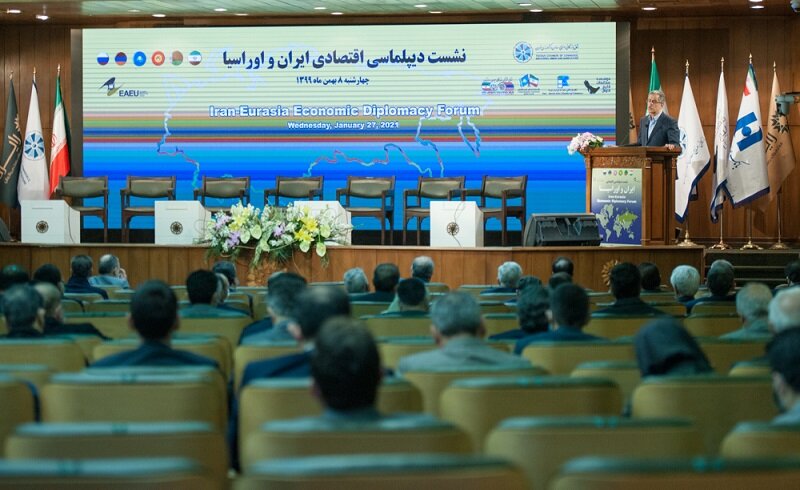TCCIMA holds Iran-Eurasia economic diplomacy meeting

TEHRAN - Tehran Chamber of Commerce, Industries, Mines and Agriculture (TCCIMA) hosted an Iran-Eurasia economic diplomacy meeting on Wednesday, TCCIMA portal reported.
Attended by senior officials including the TCCIMA Head Masoud Khansari, the Trade Promotion Organization (TPO) Head Hamid Zadboum, and the Head of Islamic Republic of Iran Customs Administration (IRICA) Reza Mir-Ashrafi, the event was held in collaboration with Persian Gulf Studies Center (PGSC) and the Iran-Russia, Iran-Kazakhstan, and Iran-Armenia Joint Chambers of Commerce.
Iranian Energy Minister Reza Ardakanian also made some remarks on the country’s trade relations with the Eurasian Economic Union (EAEU) members through a video message.
In the meeting, the attendees reviewed the requirements and aspects of developing trade relations between the two sides, and by listing the existing challenges, offered solutions to remove obstacles and problems and facilitate trade.
At the beginning of the meeting, Khansari noted that the development of economic agreements in the region will help increase stability and security in the economies of member countries.
He stressed the need for using a common currency and replacing the U.S. dollar in trade exchanges between the members of the EAEU.
Ardakanian, in his message, praised the TCCIMA for holding this specialized conference and stressed the significance of using the capacities of the preferential trade agreement with the EAEU in the development of Iran's non-oil exports.
Further in the meeting, Zadboum announced the beginning of official negotiations for establishing a free trade agreement with EAEU in less than a month and said: "Technical preparations for these negotiations have been provided.”
The official went on to point out that the preferential trade agreement with Eurasia currently covers 830 commodity items, adding that: “In negotiations between Iran and the Eurasian Union on free trade, it is likely that with the exception of about 10 tariff lines, the tariff on major trade items will be reduced to zero.”
Although the zeroing of tariffs on some items may be gradual, this process should not take more than 10 years, he explained.
Iran and Eurasian Economic Union reached a preferential trade agreement in October 2018 based on which about 830 commodity items were subjected to preferential tariffs.
The interim agreement enabling the formation of a free trade area between Iran and the EAEU was signed on May 17, 2018, and officially came into force on October 27, 2019.
Iran is a very important market in the region and the development of ties with this country is of high significance for the EAEU members (Russia, Belarus, Armenia, Kazakhstan, and Kyrgyzstan).
The free trade agreement between Iran and this union has laid the ground for the expansion of trade ties between the two sides.
The agreement with the bloc has increased Iran’s exports to the EAEU member states significantly, which is a turning point for the Islamic Republic's plans for boosting non-oil exports during the U.S. sanctions.
EF/MA
Photo: TCCIMA Head Masoud Khansari speaks in an Iran-Eurasia economic diplomacy meeting in Tehran on Wednesday.
